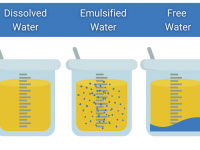Water is detrimental to many things and oil is no exception. Water at levels <0.2% is typically the result of absorption. Higher levels usually indicate a source of water ingress which enters a system primarily through seals, breathers, hatches, contaminated top-off oil and fill caps. Internal leaks through elements such as heat exchangers and water jackets are also possible.
Water in any form will accelerate wear and increase friction and operating temperatures. Non-emulsified[1] water poses a particular threat because it leads to rust and corrosion, however emulsified water will still promote oil oxidation. Aside from direct damage to the equipment itself, water will shorten lubricant life and decrease its load-handling ability--water is a very poor lubricant. Ultimately, if undetected and unmitigated, water will lead to premature equipment failure.
At Eurofins TestOil, we are more diligent about water contamination than most labs. In fact, if a Crackle Test[2] is positive, we follow it up with a no-cost Karl Fischer Water Titration using ASTM D6304 methodology.
The Karl Fischer[3] test is crucial for any industry where water can significantly affect the quality, stability, and performance of products. These industries include Chemicals, Petrochemicals and Fuel, Plastics and Polymers, Food and Beverages, and many more.
The Karl Fischer Test measures trace amounts of water. It is based on a chemical reaction that involves iodine and sulfur dioxide in the presence of water, using an alcohol solvent. The method involves two primary forms:
- Coulometric Karl Fischer Titration: is used for measuring very low levels of water (typically in the range of 10 ppm[4] to 5%). Instead of adding iodine externally, iodine is generated electrochemically in situ. As water reacts, the generated iodine decreases until the process is complete, allowing very precise measurements of minute water concentrations.
- Volumetric Karl Fischer Titration: is used for samples with higher water content (typically in the range of 1% to 100%). The sample is dissolved in a solvent, and iodine is titrated until all the water reacts. The amount of iodine used correlates to the amount of water in the sample.
During the test, samples are placed in sealed vials which are put in a temperature-controlled oven. The vial is pierced with a needle through which the water vapor travels to a titration vessel. Only water is evaporated while the oil sample remains in the vial to eliminate interference and contamination.
Water content is determined via a reaction with iodine. The titration endpoint is reached when the instrument detects unreacted iodine. Results are reported as either percent water or ppm.[5]
Accurate to .001%, Karl Fischer quantifies both emulsified and free water.
A caveat is that the Karl Fischer test is accurate as long as the sample is pulled from a representative location--ideally from an active area. The best location varies from machine to machine. Eurofins TestOil Field Services professionals can provide advice on sample location.
The Karl Fischer test is also included in Eurofins TestOil’s standard test slate. If indicated, we may recommend additional tests such as Elemental Spectroscopy, FTIR Spectroscopy, Viscosity and/or Particle Count.
For more information on working with Eurofins TestOil for oil analysis and training visit www.testoil.com. Contact: 216-251-2510; sales@testoil.com.
About Eurofins TestOil
With more than 30 years of experience in the oil analysis industry, Eurofins TestOil focuses exclusively on assisting industrial facilities with reducing maintenance costs and avoiding unexpected downtime through oil and fuel analysis program implementation. As industry experts in diagnosing oil-related issues in equipment such as turbines, hydraulics, gearboxes, pumps, compressors and diesel generators, Eurofins TestOil provides customers with same-day turnaround on routine oil analysis testing. For more information on partnering with Eurofins TestOil on oil analysis programs or training opportunities visit https://testoil.com. Contact: Al Yates 216-251-2510; sales@testoil.com.
About Eurofins – the global leader in bio-analysis
Eurofins is Testing for Life. Eurofins is the global leader in food, environment, pharmaceutical and cosmetic product testing, and in discovery pharmacology, forensics, advanced material sciences and agroscience Contract Research services. Eurofins is also a market leader in certain testing and laboratory services for genomics, and in the support of clinical studies, as well as in BioPharma Contract Development and Manufacturing. The Group also has a rapidly developing presence in highly specialised and molecular clinical diagnostic testing and in-vitro diagnostic products.
With over 61,000 staff across a network of 940 laboratories in 59 countries, Eurofins’ companies offer a portfolio of over 200,000 analytical methods. Eurofins Shares are listed on Euronext Paris Stock Exchange.
[1] Non-emulsified water, also known as free water, is water that has separated from oil due to gravity.
[2] The Crackle Test involves placing a drop of oil on a hot plate and observing for bubbles, crackling, spitting, or popping. If the oil crackles, it indicates water.
[3] Joseph Karl Anton Fischer was a German chemist born near Munich in 1901. He devised this system of determining trace water content in anything and everything-from oil to German pastries. He originally devised the test in 1937, after which the test was widely adopted and remains so today.
[4] PPM = Parts Per Million.
[5] These units are easily converted by recognizing that 1% equals 10,000 ppm.


